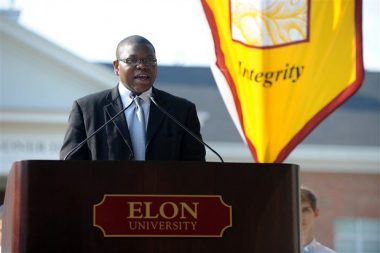Darris Means '05, a sociology and political science graduate, connects theory with practice as he studies complexities of self-identity in college students, from race to class to sexual orientation.

*****
By Caitlin O’Donnell ‘13
For Darris Means, everyday life requires the balance of a complex identity comprised of the dominant and marginalized groups he represents: A black male and first-generation college student raised in a family with financial need.
That balance has also led to a life’s calling.
Through ongoing research and his role as the associate director of the Elon Academy, Means, a 2005 Elon graduate, wants to understand the multi-dimensional nature of college students. And he was honored this fall with the Bobby E. Leach Award from the Southern Association for College Student Affairs, which recognizes a student affairs or higher education professional who has significantly contributed to the development of multicultural relations on a college or university campus.
“I’m interested in hearing the voices of people who may feel like they don’t have a voice in society,” said Means, a native of Spartanburg, S.C., who began research into campus race relations as an Elon undergraduate under the direction of Professor Tom Henricks. Means continued that work as he pursued a master’s degree in student affairs at Clemson University, and since then, the research has expanded into an examination of the experiences of underrepresented groups – LGBTQ, students of color, first generation college students – on university campuses.
“One of the big things I learned is the importance of universities making sure we provide safe spaces where all students feel comfortable coming to the table to talk about diversity in a deep way,” Means said.
While society has made strides in the area of diversity, Means said he believes more progress is needed, an idea that drives his most recent project through a Ph.D. program in educational research and policy studies at N.C. State University. That research, for which he received a grant from the North Carolina College Personnel Association, is founded in the experiences of black, male, gay students at historically black colleges and universities, a topic seldom explored through academic research.
Means has uncovered a trend that he said is reflected by other communities of oppressed people in the United States.
“There’s a sense of double consciousness, or triple consciousness, that you have to operate differently in different settings,” he said. “It can be really stressful for people. You have students operating in different segments of society having to put on a different show for each group of people they’re interacting with because they know that sometimes being gay won’t be accepted with their family or with their peers.”
His research to date has focused primarily on the experiences of black and LGBT students. Means said he strives to understand the perspectives of all students. With females, for example, he said he must be cognizant of his own position of dominance as a male.
“Whenever you’re working with students, you have to have a deep understanding that students aren’t one-dimensional,” Means said. “It’s about making sure you understand what that student brings to the table and the intersection of their identities.”
Deborah Long, director of the Elon Academy, described Means as innovative and student-centered.
“He is a team player and is passionate about his work,” she said. “He takes professional development seriously and is very interested in using research to make the Elon Academy a stronger program.”
And while Means still considers himself a novice at research, he said he has enjoyed bridging the gap between theory and practice.
“My interest and research has been a journey of self-discovery and recognizing my own privilege as a man but also recognizing my own marginalized groups,” he said. “It’s thinking about how I, as an individual, take my dominant and marginalized identities and work on behalf of all people and be an ally toward social justice.”


